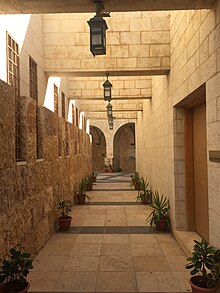| Revision as of 05:51, 22 January 2022 editGronk Oz (talk | contribs)Extended confirmed users41,501 edits →Etymology: Unreferenced section← Previous edit | Revision as of 15:30, 22 January 2022 edit undoNishidani (talk | contribs)Autopatrolled, Extended confirmed users99,541 edits WP:IAR. OR cannot form a distinct section and the etymology/meaning is already in the leadNext edit → | ||
| Line 12: | Line 12: | ||
| }} | }} | ||
| '''Al-Shuna al-Shamalyah''' ({{lang-ar|الشونة الشمالية}}, also spelled Esh-Shuneh esh-Shamaliyeh), which translates to '''North Shuna''', a name it is also known by, is a ]ian town. It is located in ], overlooking the ]. The city sits at the intersection of ] and ], and lies just south of the confluence of ] and ] rivers. | '''Al-Shuna al-Shamalyah''' ({{lang-ar|الشونة الشمالية}}, also spelled Esh-Shuneh esh-Shamaliyeh), which translates to '''North Shuna''',<ref>Abbreviated to Shunah (Shuneh/Shuna. The Arabic definite article ''al'' is commonly dropped by convention in foreign references and, subject to the following consonant, can be pronounced as ''esh/ash'', yielding here ''esh-Shuneh'' (esh-Shuneh/ash-Shunah). Likewise ''al-Shamalyah'' is often rendered ''esh-Shamaliyeh/ash-Shamaliyah''. (editor's note)</ref> a name it is also known by, is a ]ian town. It is located in ], overlooking the ]. The city sits at the intersection of ] and ], and lies just south of the confluence of ] and ] rivers. | ||
| ==Etymology== | |||
| {{Unreferenced section|date=January 2022}} | |||
| Shunah is also spelled Shuneh and Shuna. Al- is the Arabic ], and for the beginning of place-names, at least when reproduced in English, common convention allows for them to be dropped. The article is in some cases pronounced in correlation with the following consonant, so al-Shuneh is pronounced esh-Shuneh and can also be spelled esh-Shuneh or ash-Shunah. Similarly, al-Shamalyah is often spelled esh-Shamaliyeh or ash-Shamaliyah. | |||
| Sham is Arabic for "north", so al-shamalyah means "northern". Therefore, Al-Shunah al-Shamaliyah translates to "North Shuna". | |||
| ==History== | ==History== | ||
Revision as of 15:30, 22 January 2022
Town in Jordan| Al-Shuna Al Shamalyah الشونة الشمالية | |
|---|---|
| Town | |
 | |
| Coordinates: 32°36′36″N 35°36′29″E / 32.61000°N 35.60806°E / 32.61000; 35.60806 | |
| Grid position | 207/224 |
| Country | |
| Population | |
| • Total | 25,000 |
Al-Shuna al-Shamalyah (Template:Lang-ar, also spelled Esh-Shuneh esh-Shamaliyeh), which translates to North Shuna, a name it is also known by, is a Jordanian town. It is located in Irbid Governorate, overlooking the Jordan River Valley. The city sits at the intersection of Highway 65 and Highway 10, and lies just south of the confluence of Yarmouk and Jordan rivers.
History
The Jordanian census of 1961 found 3,462 inhabitants in Al-Shuna al-Shamalyah.
Sites
Tell esh-Shuneh
In 1953, archaeologists Henri de Contenson and James Mellaart excavated the site of Tell esh-Shuneh, overlooking the Wadi el-Arab, just outside of the city. The site was re-excavated in the 1980s by Carrie Gustavson-Gaube and again in the 1990s by Durham University. The artifacts recovered from Tell esh-Shuneh include remains of structures, pottery, and silver dating from the Chalcolithic and Early Bronze Age. Excavations also uncovered numerous macrobotanical remains, suggesting that both Chalcolithic and Early Bronze Age settlements at the site utilized agricultural irrigation.
Shrine of Muadh ibn Jabal

The tomb of Muadh Ibn Jabal (official name in Template:Lang-ar), a prominent Sahabah of Muhammad and compiler of the Quran, is located in Al-Shuna al-Shamalya. The tomb is noted for its pleasant, yet allegedly unexplained smell.
References
- "موقع عرب 48". موقع عرب 48. Retrieved 2016-12-11.
- Abbreviated to Shunah (Shuneh/Shuna. The Arabic definite article al is commonly dropped by convention in foreign references and, subject to the following consonant, can be pronounced as esh/ash, yielding here esh-Shuneh (esh-Shuneh/ash-Shunah). Likewise al-Shamalyah is often rendered esh-Shamaliyeh/ash-Shamaliyah. (editor's note)
- Government of Jordan, Department of Statistics, 1964, p. 14
- Kafafi, Zeidan. "Henri De Contenson's Archaeological Fieldwork in the Eastern Part of the Jordan Valley: A Re-Evaluation". IFPO - Institut Français du Proche-Orient.
- Graham, Philip; Rehren, Thilo. "Fourth millennium BC silver from Tell esh-Shuna, Jordan: archaeometallurgical investigation and some thoughts on ceramic skeuomorphs". Oxford Journal of Archaeology. 15 (2): 129–150. ISSN 0262-5253.
- Jenkins, Emma; Baker, Ambroise; Elliott, Sarah (2011), "Past plant use in Jordan as revealed by archaeological and ethnoarchaeological phytolith signatures", Water, Life and Civilisation (PDF), Cambridge University Press, pp. 381–400, doi:10.1017/cbo9780511975219.023, ISBN 9780511975219
- Blogger, Rawabat (2016-12-04). "Jordan and Jerusalem 2016: > Chasing the Fragrant Grave of Muadh Ibn Jabal". Jordan and Jerusalem 2016. Retrieved 2018-11-20.
Bibliography
- First Census of Population and Housing. Volume I: Final Tables; General Characteristics of the Population (PDF). Government of Jordan, Department of Statistics. 1964.
| Capital | |
|---|---|
| Departments | |
| Cities and towns | |
| Others | |
This Jordanian location article is a stub. You can help Misplaced Pages by expanding it. |